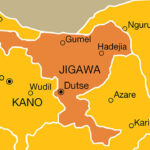A new survey by Germany-based Otto Brenner Foundation in Frankfurt says media organisations including in Europe failed to report in-depth the crisis in Mali and the entire Sahel region, leading to lack of accurate information in the African region.
The survey noted that the French news agency AFP and the German press agency DPA are particularly influential but “around 40 per cent of all contributions came from correspondents who are not on the ground in the Sahel region.”
They report from Cape Town, Paris, Berlin, and Rabat, which are between 2,400 and 6,000 kilometres from Bamako/Mali, the survey pointed out.
“The activities of the German Armed Forces are never investigated in depth on the ground. The geographical focus of the reporting is on four countries: Mali, France, Germany and Chad. To a small extent, regional observations are made about regional interrelations,” the survey added.
- 150 Lagos civil servants inducted into institute
- Christmas: Let’s unite against common enemies – CDS
A founding member of Pan-African-European Organisation Africa Vagabonds, Lutz Mükke, urged media houses to professionalise war and crime reporting especially as it relates to Africa.
He argued that professionalisation was essential for the indepth and high quality democratic discourse on war and crisis reporting in the region.
Mükke said this in a study titled: “Media Routines and Ignorance?”
In 2023, the Otto Brenner Foundation in Frankfurt am Main, Germany, published this survey about the coverage of the Sahel interventions of the German army in leading German mass media in collaboration with the pan-African-European association, Africa Vagabonds.
A copy of the study was shared with newsmen in Abuja.
In the study, Mükke said the historic defeat of the West in Afghanistan, the Iraq and Libya disasters, Syria, the proxy war in Yemen and the currently escalating Russia-Ukraine war provided more than enough reason for editorial offices to professionalise their crisis and war reporting.
“The results are a scandal: Experts from Mali, Niger and Germany criticise the media’s “oversimplified perceptions of reality” of the Sahel conflicts heavily, and the fading out of debates of the German parliament on the matter in the media coverage is met with incomprehension.”
He said: “There had been no proper contribution by these essential leading media for a democratic discourse about the military interventions of the German army.
“Details from the content analyses during the period under review, 41 online articles on the complex topic were published in the analysed four national media.
“The French news agency AFP and the German press agency DPA are particularly influential. Around 40 per cent of all contributions came from correspondents. However, they are not on the ground in the Sahel region, they report from Cape Town, Paris, Berlin, and Rabat, which are between 2,400 and 6,000 kilometres from Bamako/Mali. The activities of the German Armed Forces are never investigated in depth on the ground. The geographical focus of the reporting is on four countries: Mali, France, Germany and Chad. To a small extent, regional observations are made about regional interrelations.
“None of the media analysed considered it appropriate to place their reports from the ground in the Sahel region or more complex investigative contributions or storytellings. There are no editorials, interviews, portraits or reviews on the topic, only two commentaries. Monotony also prevails in the departmentalisation, almost all articles appear under the headings “Politics” and “Abroad”.

 Join Daily Trust WhatsApp Community For Quick Access To News and Happenings Around You.
Join Daily Trust WhatsApp Community For Quick Access To News and Happenings Around You.

